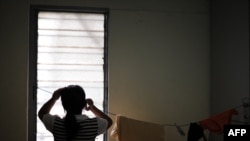Ethnic Chin refugees from Myanmar in Malaysia are accusing the United Nations refugee agency UNHCR of abuse and of not providing necessary protection, potentially putting lives at risk.
Hundreds of members of the Alliance of Chin Refugees held a demonstration Thursday outside the UNHCR office in Malaysia’s capital, Kuala Lumpur.
Chins, most of whom are Christians, are an ethnic and religious minority in Buddhist-majority Myanmar who face repression that has led to violent conflicts there. In recent decades, waves of ethnic Chins have fled the country, many to Malaysia.
U.N. figures from last month show there are about 27,250 ethnic Chin refugees and asylum-seekers in Malaysia registered with UNHCR. But James Bawl Thang Bik, chairman of the Alliance of Chin Refugees, told VOA on Thursday there are tens of thousands more who are not registered.
He also said the UNHCR takes too long to make decisions for asylum-seekers who have applied for refugee status. “The process can take years,” he said.
VOA asked UNHCR Malaysia how long it typically takes for an applicant to get a decision on their case but did not receive an immediate answer.
Further complicating matters, Malaysia has not signed the United Nations refugee convention and does not officially recognize refugees, viewing them as illegal immigrants.
UNHCR registration provides some protection that typically prevents arrest, but the refugees are still not allowed to attend government schools or work legally — although many take off-the-books jobs, leaving them vulnerable to exploitation by employers, according to migrant rights groups.
James Bawl Thang Bik said that after Myanmar’s 2021 coup approximately 50 ethnic Chin Myanmar soldiers and police officers fled to Malaysia because they refused to fight for Myanmar's military. He said some of them have been arrested and are in detention in Malaysia because they lack UNHCR documentation.
“If these former soldiers and policemen get sent back to Myanmar their lives could be in danger,” he said.
“UNHCR needs to prioritize these types of cases and register them quickly.”
UNHCR documentation also gives refugees access to medical care at public hospitals for lower prices than what foreigners typically pay but the Alliance of Chin Refugees said asylum-seekers without UNHCR documentation frequently need medical treatment but cannot get it.
“The UNHCR needs to meet with these people immediately and give them the necessary status and documentation,” Bik said, mentioning cases of people with broken bones and serious infections.
Responding to media inquiries after Thursday’s demonstration, the United Nations refugee agency released a written statement that said: “UNHCR wishes to emphasize that we recognize the frustration felt by many refugee communities living in the complex protection environment in Malaysia where they lack legal status, are unable to access legal work or formal education. … UNHCR is doing its utmost to protect and assist refugees. This includes prioritizing protection and assistance interventions for highly vulnerable refugees.”
Additionally, Bik said he has received reports about security guards outside the UNHCR office punching and kicking ethnic Chins trying to get in without appointments.
UNHCR responded in its written statement saying it has “zero tolerance” for this type of treatment but also said: “At this time, we have not received any reports of abuse by security personnel from any individual refugee from the Chin Community.”
The alliance chairman dismissed the UNHCR’s response as false. “We have told them about mistreatment many times,” he said.




